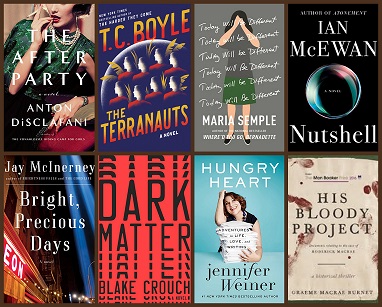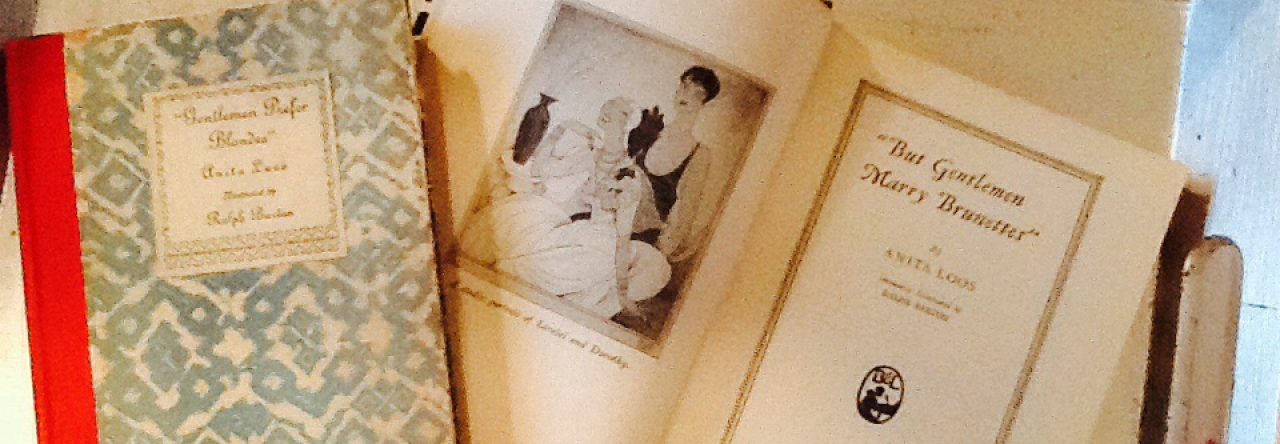Happy New Year’s Eve! This year will certainly be remembered for its many losses and disappointments, but a bright spot for me was the tremendous number of good books I got to read. And isn’t that what a good book should do? Take us out of reality for a bit?

Fall is always a busy time so while I was able to jealously guard my reading time (priorities!) I did not get a chance to sit down and write about some of the titles I enjoyed. Hopefully the new year will bring more free time – or better time management. Or time management books.
I hope the holidays have brought you books, and gift cards you can use for books. Here are eight of my recent favorites in no particular order, and if you don’t have book money I, of course, recommend you look for these titles at your Library!
Fans of Fitzgerald, Cheever, and other chroniclers of the woes of the upper class should enjoy these first two titles. I loved Anton DiSclafani’s debut novel “The Yonahlossee Riding Camp for Girls” (2013) and couldn’t wait to get my hands on her newest “The After Party” (May 17, 2016.) DiSclafani writes beautifully and incisively about a type of needy female friendship, mothers and daughters, growing up, and growing apart. Set in the rarefied world of 1950s moneyed, oil-boom Houston she ably illustrates the great benefits and frustrations that come with a gilded cage and a life all planned out for you.
Moving to the recent present in “Bright, Precious Days” (Aug. 2, 2016) we revisit Team Art and Love’s Russell and Corrine Calloway, the New York couple McInerney uses to put a period on eras and events (the 1980s in “Brightness Falls,” 1992, September 11, in “The Good Life,” 2006, and here the recent financial meltdown). They are in their fifties, and occasionally wondering if it might have made more sense to sign on with Team Money and Power all those years ago, as Corrine muses, they “based their lives on the premise that money couldn’t buy happiness learning only gradually the many varieties of unhappiness it might have staved off.” Russell is still hanging on to his Midwestern dreamer’s view of glamorous New York publishing society and does not want to consider moving even a mile for more living space, or better schools for the kids.
Their late friend, writer Jeff Pierce, is seeing a resurgence among the hipster set and Russell finds himself in demand by young people in the slightly puzzling “blogosphere” to reminisce about Jeff. He is also trying to mentor along a new writer whose talent could boost his publishing house, but comes with many of the stereotypical destructive artist appetites. And Russell spends way too much time engaging in the current sport of the privileged – fetishizing food. A scene where he takes Corrine to experience a very exclusive chef’s tasting menu is both hilarious and horrific. Meanwhile Corrine is feeling her age and dealing with the return of her ex-lover, last seen in “The Good Life.” The Calloways are not always likeable – and why should they be? – they are flawed and human and in McInerney’s hands not unsympathetic. They are a lens into how the other half lives, when the other half is keeping up appearances.
If you are a certain age you remember Biosphere 2 – an experimental closed ecosystem facility built in the late 1980’s/early 1990’s. TC Boyle’s Terranauts (Oct. 25, 2016), is loosely based on Ecosphere 2’s two “missions.” After a long involved selection process eight “terranauts,” a combination of scientists, PR, and medical professionals, are sealed into the facility for two years to see whether the Ecosphere can sustain and renew life. Most of the story revolves around idealistic, wide-eyed but ambitious Dawn Chapman, the manager of domestic animals, her friend Linda Ryu (bitter about losing her spot on the crew to Dawn and instead working at mission control in hopes of having a spot in the third mission), and Ramsay Roothorp, the crew public relations officer and resident lothario. So, eight adults locked in for two years, under media scrutiny, and with dwindling resources – what could go wrong? I always love TC Boyle’s work and this study in humanity under pressure is thoroughly enjoyable.
When you need a fast read that keeps you turning the pages try “Dark Matter” (July 26, 2016) by Blake Crouch, an inventive rumination on what happens to the road not taken. Jason Dessen, a physics prof at a small college, is kidnapped on his way home, knocked out and wakes up in a lab he doesn’t recognize being applauded by people who seem to know him. What follows is a mind-bending adventure as he tries to find his way back to his wife and son – to say more would ruin the fun of the novel. If you are a science person who gets irked when implausible science is part of a book you might want to give this a miss, if you just like a good thriller to pass the time this is a good bet.
Fans of Maria Semple’s “Where’d You Go Bernadette” will likely enjoy her newest “Today Will Be Different” (Oct. 4, 2016.) Eleanor Flood opens her day with an hilarious list of affirmations. Even if you can’t relate to I will “only change into yoga clothes for yoga, which today I will actually attend,” or “today I will buy local,” you can probably relate to “today will be different.” With an opening like that things can only go pear-shaped. Eleanor, 50, an animator, wife to a surgeon, mother to a charming boy with the odd name Timby (an auto-correct that stuck), spends a day caroming from one madcap situation to the next, Timby in tow, in pursuit of her husband who has been spending his time who-knows-where lately. Each incident dredges up new memories of her childhood, early career, early marriage, and estranged sister. You might want to shake her sometimes and yell “get it together!” but most of us have a friend like that, right? She’s funny and frustrating, and flawed, and you root for her.
If you want a real woman to root for you might pick up author Jennifer Weiner’s essay collection/memoir “Hungry Heart: Adventures in Life, Love, and Learning” (Oct. 11, 2016.) I will be honest – I have never read one of her books, though they are wildly popular at my library. Here she is funny, refreshing, and honest. She writes about her childhood, her parents, struggles with body image, and what led her to start writing, as well as topics on which she is known for being outspoken (sexism in publishing and the relegation of so-called women’s fiction to the literary basement.)
If you are looking for something short and clever you might try Ian McEwan’s “Nutshell,” a quirky little contemporary take on “Hamlet” in which the narrator is in utero. Our protagonist has overheard his mother Trudy plotting with her lover Claude to murder his father. What to do, what to do. Try not to overthink it first of all. The fetal narrator has a charming cadence – a bit like if a brighter Bertie Wooster spent a lot of time ruminating in the womb. An enjoyable diversion for a rainy day.
My final book is “His Bloody Project: Documents Relating to the Case of Roderick Macrae” (by Graeme Macrae Burnet. Purporting to be a collection of found papers, most notably a well-written first-hand account by the accused, related to a brutal triple-murder in 1869, in Culduie, an isolated village in Scotland. This historical novel shows a grim picture of life as a “crofter,” or, tenant farmer. Roddy Macrae has murdered Lachlan Broad, and two of his children, of this there is no doubt. His recollection, along with statements from neighbors, friends, teachers, preachers, the findings of an alienist sent to examine him by his lawyer, and trial transcripts create an ever-shifting picture of the 17-year-old, and serve to also illustrate social and political realities for the bright underclass. That a bright boy might snap under the pressures of an unfair class system is unsurprising. This well-written suspenseful mystery is a must for fans of historical crime fiction. “His Bloody Project” was longlisted for the 2016 Man Booker prize.
Happy Reading!
Advance galleys of these books were provided by the publishers in exchange for an honest opinion.
